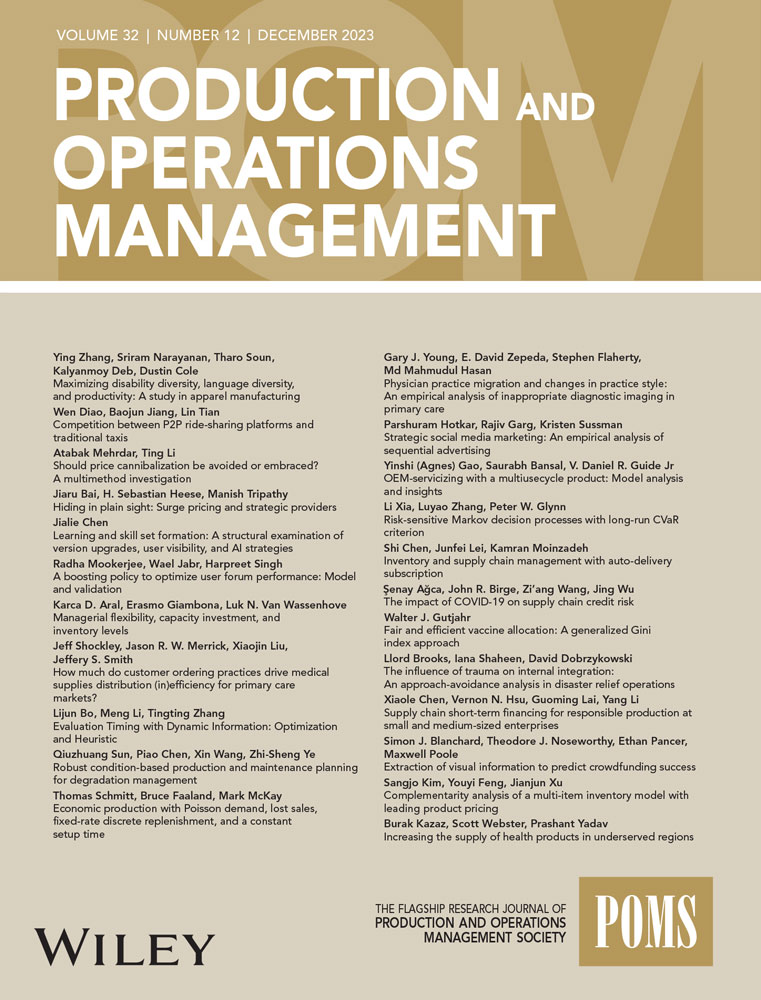个人制造作为一种运营策略:使用3D打印将生产委托给客户的价值
IF 5.1
3区 管理学
Q1 ENGINEERING, MANUFACTURING
引用次数: 0
摘要
业界对3D打印的兴趣越来越大。一个相关的现象是个人制造(PF),即公司销售产品设计,让客户使用3D打印服务个性化和制造产品。在本文中,我们描述了使PF成为一种有吸引力的运营策略的市场和运营条件。我们提出了一个需求市场模型,该模型捕捉了品味(水平)和质量(垂直)维度上的客户异质性,同时允许市场在高估值客户和低估值客户之间发生倾斜。我们量化了PF战略的三个关键好处:(i) PF战略实现个性化并改善产品适配性,(ii) PF战略可以通过推迟产品配置来帮助公司,以及(iii) PF战略使设计调整更容易,并允许可制造性计划的设计。知识产权和责任风险是采用PF战略的重大障碍。此外,3D打印对于产品的某些部分可能不可行。在这些情况下,公司可能会采取部分PF策略:只委托一部分产品给客户生产。我们还确定了部分PF何时成为有吸引力的策略。本文章由计算机程序翻译,如有差异,请以英文原文为准。
Personal fabrication as an operational strategy: Value of delegating production to customer using 3D printing
Abstract There is a growing interest in the industry around 3D printing. A related phenomenon is personal fabrication (PF) in which a firm sells products' design and lets the customers personalize and manufacture the product using 3D printing services. In this paper, we characterize the market and operational conditions that make PF an attractive operational strategy. We propose a demand market model that captures customer heterogeneity in taste (horizontal) and quality (vertical) dimensions while allowing the market to be skewed with high versus low valuation customers. We quantify three key benefits of PF strategy: (i) the PF strategy enables personalization and improves product fit, (ii) the PF strategy can help the firm through postponement of product configuration, and (iii) the PF strategy enables easier design adjustments and allows design for manufacturability initiatives. Intellectual property and liability risks are significant barriers to the adoption of PF strategy. Furthermore, 3D printing may not be feasible for some parts of the product. In these cases, the firm may pursue the partial PF strategy: delegating only a proportion of the product for customer production. We also identify when partial PF becomes an attractive strategy.
求助全文
通过发布文献求助,成功后即可免费获取论文全文。
去求助
来源期刊

Production and Operations Management
管理科学-工程:制造
CiteScore
7.50
自引率
16.00%
发文量
278
审稿时长
24 months
期刊介绍:
The mission of Production and Operations Management is to serve as the flagship research journal in operations management in manufacturing and services. The journal publishes scientific research into the problems, interest, and concerns of managers who manage product and process design, operations, and supply chains. It covers all topics in product and process design, operations, and supply chain management and welcomes papers using any research paradigm.
 求助内容:
求助内容: 应助结果提醒方式:
应助结果提醒方式:


